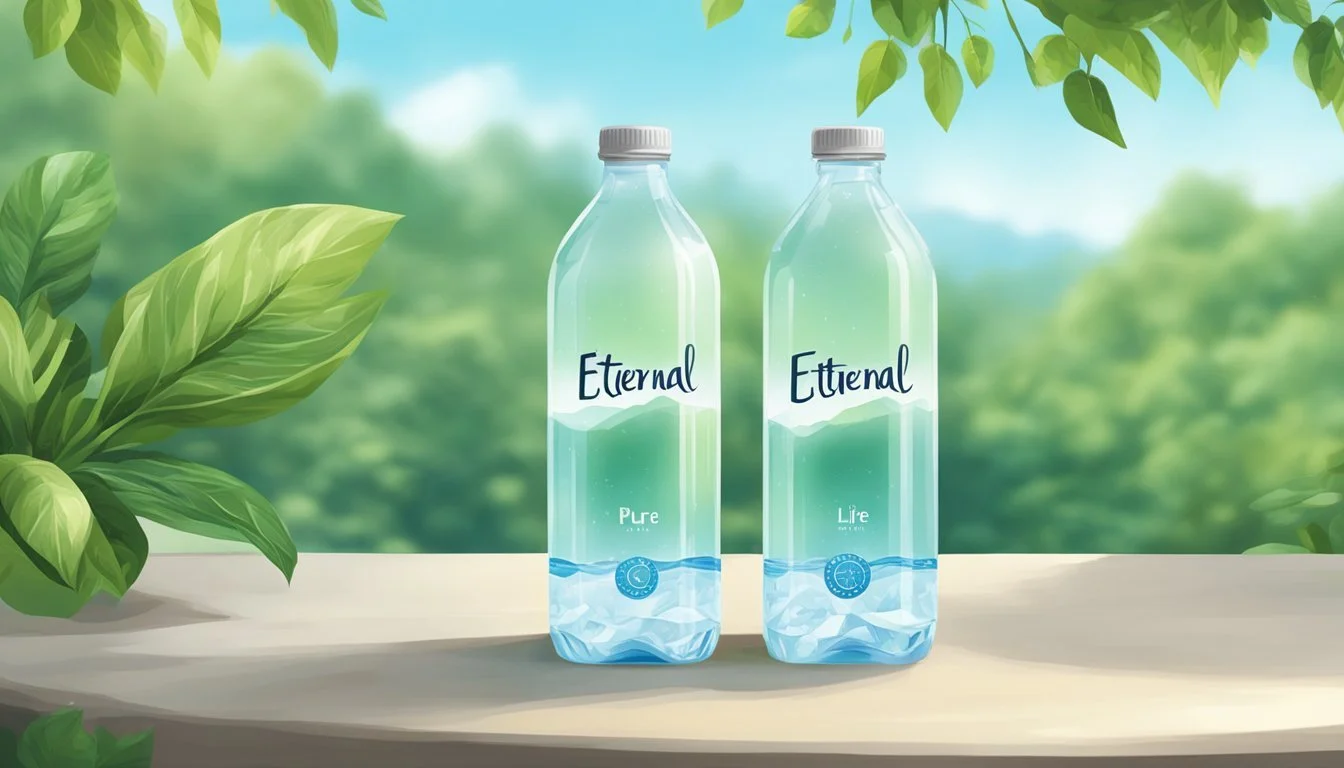Eternal vs. Pure Life
Comparing Top Bottled Water Brands
Choosing the right bottled water brand can significantly impact both health and taste preferences. Eternal and Pure Life are two popular choices on the market today, each with its own distinct qualities. Eternal Water undergoes natural filtration, which may reduce heavy metals and other contaminants, ensuring a high purity level.
Pure Life, on the other hand, is known for adhering to strict FDA bottled water quality standards, offering consumers a reliable choice for safe and clean drinking water. Despite this, opinions on taste and overall satisfaction vary among consumers. By examining the qualities of both brands, readers can make an informed decision based on their own priorities and needs.
Understanding the differences in filtration processes and purity levels between Eternal and Pure Life helps in appreciating their unique characteristics. This blog post will explore these aspects to determine which of the two bottled water brands might be the better option for you.
Understanding Bottled Water
Bottled water comes in various types, each differing by source and treatment process. Regulatory standards ensure its safety, and comparisons to tap water highlight distinct characteristics and consumer perceptions.
Types of Bottled Water
Spring Water: This type comes from underground formations where water naturally flows to the surface. It is often bottled at the source and retains its natural mineral profile.
Purified Water: Includes water that has undergone processes like distillation, deionization, or reverse osmosis. These methods remove impurities, making the water very pure but stripping away natural minerals.
Mineral Water: Contains minerals and trace elements naturally present in the source. It must have at least 250 parts per million of total dissolved solids and is collected from protected underground sources.
Alkaline Water: Has a higher pH, typically achieved through an ionization process or naturally occurring in certain water sources. Claims suggest it can neutralize acid in the bloodstream and provide health benefits.
Distilled Water: Created by boiling water, collecting the steam, and condensing it back into a liquid. This removes more impurities and minerals than other methods, yielding very pure water.
Bottled Water Regulations
Both the FDA and EPA are responsible for regulating bottled and tap water in the United States. The FDA oversees bottled water, ensuring it meets strict standards for safety, labeling, and quality. Treatments like reverse osmosis and ultraviolet exposure are common for compliance.
EPA regulations govern tap water. While tap water undergoes rigorous testing and treatment to remove contaminants, bottled water must also adhere to high standards, although some critics argue the regulations for bottled water are less stringent.
Important Standards:
Contaminant Levels: Both bottled and tap water must limit harmful contaminants like lead and bacteria.
Labeling: Bottled water labels must accurately reflect the water's source and treatment method.
Bottled vs. Tap Water
Tap Water: Often chlorinated and treated with other chemicals to eliminate pathogens, it is typically tested more frequently. Economically, it is significantly cheaper than bottled water.
Bottled Water: Offers convenience and a perception of higher purity. Types like spring and mineral water are preferred for their taste and natural mineral content. Purified and distilled options are chosen for their lack of impurities.
Cost: Bottled water is considerably more expensive. While tap water costs pennies per gallon, bottled varieties can be several dollars per liter.
Environmental Impact: Bottled water production and plastic waste contribute to environmental concerns. Efforts to use recyclable materials and promote reusable bottles are increasing.
Understanding these facets helps consumers make informed choices regarding their water consumption based on health, cost, taste, and environmental factors.
Branding and Perception
Eternal and Pure Life represent two distinct identities in the bottled water industry, each with unique branding strategies and consumer perceptions. This section explores how these aspects influence their market positions.
Brand Profiles
Eternal Water:
Eternal Water markets itself as a premium, naturally alkaline spring water. It emphasizes purity, drawn from protected underground sources in the United States. The brand's messaging focuses on health benefits and natural origins, setting it apart from more mass-market options.
Pure Life:
Nestlé Pure Life is positioned as an affordable, accessible bottled water. It sources water from well or municipal supplies and undergoes extensive purification. Its branding emphasizes quality and trustworthiness, leveraging Nestlé's global reputation. This broad market approach aims to reach a wide audience by offering consistent, safe drinking water.
Consumer Preferences
Eternal Water Consumers:
Consumers of Eternal Water are typically health-conscious and prefer natural products. They value the alkalinity and source purity promised by the brand. Eternal caters to a niche market seeking premium water with specific health benefits, often willing to pay a premium for these attributes.
Pure Life Consumers:
Pure Life's consumers prioritize affordability and reliability. They prefer a product backed by a recognized brand like Nestlé. This demographic is less focused on the advanced health benefits and more on consistent, safe hydration that fits within a budget. Pure Life appeals to a broad consumer base, including families and cost-conscious buyers.
Marketing Impact
Eternal Water Marketing:
Eternal uses targeted marketing to highlight its natural source and health benefits. Efforts include digital campaigns, influencer partnerships, and prominent placement in health food stores. The emphasis is on the unique story of its water's origin and its role in a healthy lifestyle.
Pure Life Marketing:
Pure Life leverages Nestlé's extensive distribution network and marketing resources. The brand runs extensive advertising campaigns across various media, highlighting its purification process and commitment to safety. Marketing often focuses on the everyday reliability and accessibility of Pure Life, exploiting Nestlé's extensive market presence to reach a broad audience.
Eternal and Pure Life, through their distinct branding and marketing strategies, have carved out unique positions in the bottled water market. Their appeal to different consumer preferences underscores the diversity within this competitive industry.
Health and Hydration
Eternal Water and Pure Life offer different health benefits related to hydration, electrolyte concentration, and overall water quality. Understanding these differences helps in making an informed choice.
Hydration Benefits
Eternal Water boasts a natural alkalinity with a pH of around 7.8 to 8.2, which some believe aids in hydration and maintaining the body’s pH balance. This alkaline nature might make it a preferable choice for those looking to boost their hydration levels.
Pure Life, sourced and processed to meet FDA standards, is praised for its reliability and consistency. While it does not have the same alkalinity as Eternal Water, it is still effective in keeping the body hydrated.
Both brands provide essential hydration, but the alkaline nature of Eternal Water may offer added benefits.
Electrolyte Content
Electrolytes are crucial for various bodily functions, including muscle function and maintaining blood pressure. Eternal Water contains naturally occurring minerals like magnesium sulfate and potassium chloride, which can enhance its electrolyte profile.
Pure Life is purified and may include added minerals for taste. However, the added minerals may not be as beneficial as the naturally occurring ones in Eternal Water. The purified nature of Pure Life means its electrolyte content might be less pronounced.
For those prioritizing electrolyte intake, Eternal Water might have a slight edge.
Water Quality and Health
Eternal Water undergoes natural filtration, reducing the presence of potential contaminants like heavy metals. This natural filtration process ensures a high level of purity and potentially offers health benefits associated with fewer contaminants.
Pure Life adheres to strict FDA standards for bottled water quality, ensuring safety from contaminants. Despite this, some sources suggest that it might contain other additives or sweeteners, which could affect its purity level compared to Eternal Water.
Ensuring high water quality and minimal contaminants, both brands maintain rigorous standards, but Eternal Water’s natural filtration might provide a small advantage in purity.
Water Sources and Purity
A key factor in comparing Eternal and Pure Life bottled waters is their source and purity. Both brands abide by stringent standards to ensure safe consumption, but their origins and purification processes differ.
Natural Sources
Eternal Water originates from natural, protected aquifers in the USA. These aquifers are typically located in secluded mountain environments that provide a naturally filtered source.
Pure Life water is sourced from multiple locations. This includes municipal sources and underground wells, both within the USA and globally.
Using varied sources means Pure Life may have a more variable profile in terms of mineral content compared to Eternal’s more consistent natural source.
Purification and Filtration Processes
Pure Life undergoes a rigorous purification process, which often includes reverse osmosis, demineralization, and advanced disinfection techniques. This ensures the removal of contaminants and maintains high safety standards.
Eternal Water utilizes a natural filtration process where water passes through layers of volcanic rock and sand. This natural method helps in maintaining essential minerals while filtering out impurities.
Both brands follow FDA standards for bottled water, ensuring microbe and contaminant levels are kept within safe limits. Additionally, each brand uses methods suited to their specific water sources, achieving distinct purity levels and taste profiles.
Water Composition and Quality
Eternal Water is rich in naturally occurring minerals like calcium, magnesium, and potassium. These contribute to its alkaline nature, typically resulting in a pH level of around 7.8 to 8.2, considered beneficial for health.
Pure Life water, after undergoing purification processes, often has minerals reintroduced to enhance taste. This results in a balanced flavor but with less mineral content compared to naturally sourced waters like Eternal.
The mineral composition profoundly influences the taste, with Eternal offering a more pronounced, natural taste due to its alkaline minerals. Pure Life aims for a clean, straightforward taste, appealing to those who prefer minimal mineral content.
Taste and Mineral Content
When comparing Eternal and Pure Life bottled water, it is essential to consider both their taste profiles and their mineral content, as these factors significantly impact consumer preferences. Each brand's source and mineral composition contribute to the unique flavor of the water.
Taste Profiles of Different Brands
Eternal water is often praised for its pleasantly smooth taste. Derived from natural springs, it boasts a clean and refreshing flavor without any aftertaste. This is attributed to the natural filtering process that removes impurities while maintaining essential minerals.
Pure Life, produced by Nestlé, has a different taste profile. Often described as neutral and consistent, it undergoes purification processes and is sourced from various locations. Some consumers find it lacks a distinct flavor, making it an acceptable but not remarkable choice.
Mineral Content and Water Flavor
The distinct mineral content in bottled water significantly influences its taste. Eternal water contains a balanced mix of minerals. Calcium, magnesium, and potassium are present in moderate amounts, contributing to a subtly sweet and smooth flavor.
Pure Life, on the other hand, has a lower mineral content due to its extensive purification. This results in a more neutral tasting water, with fewer naturally occurring minerals. Sodium and other minor elements may be added for taste enhancement, but they do not provide a significant flavor impact.
In sum, both waters offer different experiences: Eternal with its natural and rich mineral profile and Pure Life with a neutral and purified touch.
Cost and Accessibility
When comparing Eternal and Pure Life bottled waters, it's essential to consider their price points and how easily they can be purchased. These factors often influence consumers' decisions when selecting a brand.
Price Points
Pure Life is often recognized for its affordability. Retail prices for Pure Life typically range from $0.50 to $1 per bottle, making it an economical choice for everyday consumption. Bulk purchases and frequent promotions further lower the overall cost per unit, appealing to budget-conscious shoppers.
Eternal, on the other hand, tends to be more expensive. Prices can vary between $1.50 to $2.50 per bottle due to its natural filtration processes and higher pH level. Despite the higher cost, many consumers find the quality and taste of Eternal justifies the premium price.
Both brands offer various packaging options, from individual bottles to larger packs, enhancing their accessibility and convenience.
Environmental Considerations
The production and disposal of plastic bottles contribute significantly to environmental pollution. Comparing Eternal and Nestlé Pure Life involves assessing both their sustainability practices and the impact of plastic waste.
Bottled Water and Plastic Waste
Plastic waste remains a significant environmental issue tied to bottled water. Both Eternal and Nestlé Pure Life use PET plastic for their bottles, which is recyclable but often ends up in landfills or oceans. Annually, millions of tons of plastic waste pollute the environment, harming wildlife and ecosystems.
Nestlé Pure Life has made efforts to reduce their environmental footprint by light-weighting their bottles, which means using less plastic. However, without a robust recycling plan, the impact remains substantial. Poor waste management and low recycling rates exacerbate the problem, leading to increased environmental degradation.
Sustainable Options
To address these concerns, companies like Eternal and Nestlé Pure Life have looked into sustainable alternatives. Eternal Water emphasizes that their water undergoes natural filtration processes, potentially supporting eco-friendly practices. They also offer larger bottle sizes to reduce plastic usage per liter of water consumed.
Nestlé Pure Life has explored options like boxed water and the use of recycled PET (rPET) for their bottles. These efforts, while positive, must be scaled significantly to make a considerable environmental impact. They have also partnered with organizations to promote better recycling habits among consumers.
Choosing eco-friendly options, such as boxed water or brands using recycled materials, can significantly mitigate the environmental impact of bottled water. It is also important for consumers to support and participate in recycling programs to help manage plastic waste effectively.
More About Eternal
Eternal vs Icelandic Glacial: Which Bottled Water is Better?
Eternal vs Kirkland Signature: Which Bottled Water is Better?
Eternal vs Mountain Valley Spring Water: Which Bottled Water is Better?
Eternal vs Richard's Rainwater: Which Bottled Water is Better?
Eternal vs Whole Foods Italian Still Mineral water: Which Bottled Water is Better?
More About Pure Life
Cascade Mountain vs Pure Life: Which Bottled Water is Better?
Hawaii Volcanic vs Pure Life: Which Bottled Water is Better?
Hawaiian Springs vs Pure Life: Which Bottled Water is Better?
Icelandic Glacial vs Pure Life: Which Bottled Water is Better?
Nestle Pure Life vs Pure Life: Which Bottled Water is Better?
Pure Life vs Kirkland Signature: Which Bottled Water is Better?
Pure Life vs Whole Foods 365: Which Bottled Water is Better?
Richard's Rainwater vs Pure Life: Which Bottled Water is Better?
Solan de Cabras vs Pure Life: Which Bottled Water is Better?
Talking Rain AQA vs Pure Life: Which Bottled Water is Better?
Whole Foods Italian Still Mineral water vs Pure Life: Which Bottled Water is Better?






